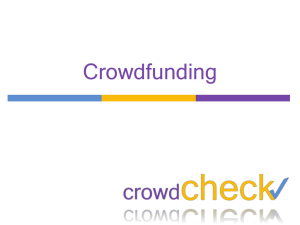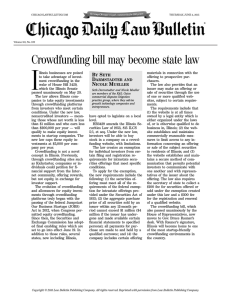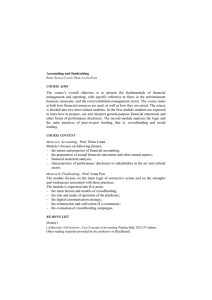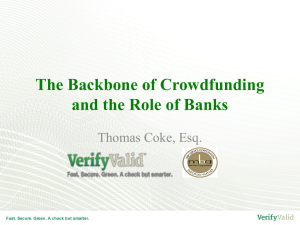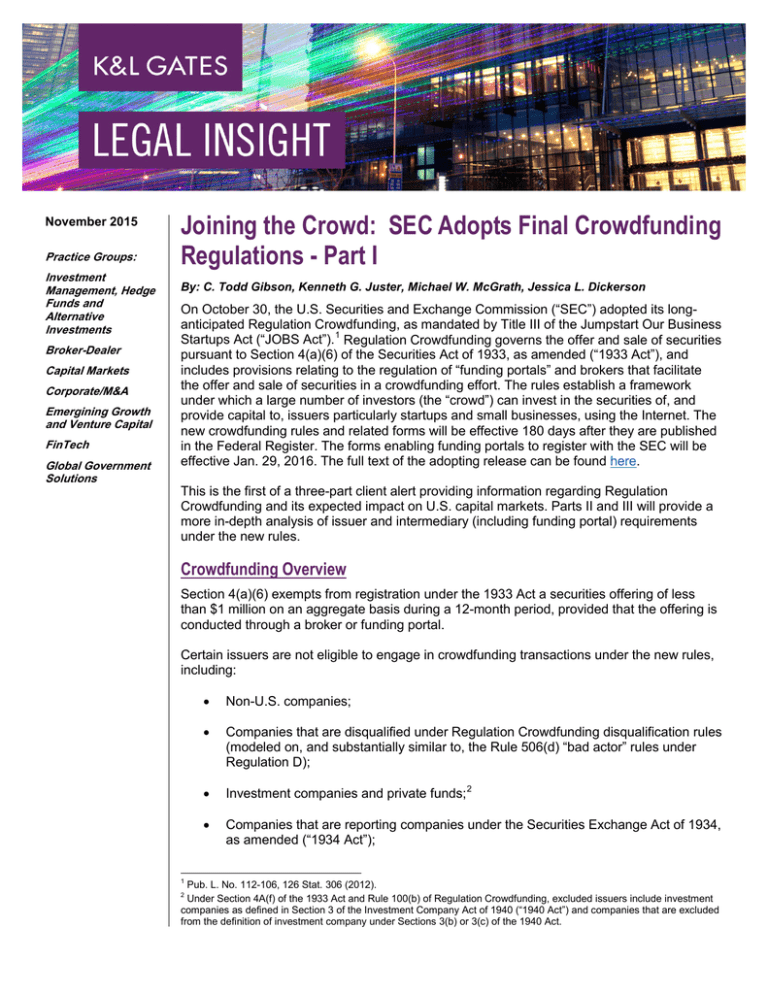
November 2015
Practice Groups:
Investment
Management, Hedge
Funds and
Alternative
Investments
Broker-Dealer
Capital Markets
Corporate/M&A
Emergining Growth
and Venture Capital
FinTech
Global Government
Solutions
Joining the Crowd: SEC Adopts Final Crowdfunding
Regulations - Part I
By: C. Todd Gibson, Kenneth G. Juster, Michael W. McGrath, Jessica L. Dickerson
On October 30, the U.S. Securities and Exchange Commission (“SEC”) adopted its longanticipated Regulation Crowdfunding, as mandated by Title III of the Jumpstart Our Business
Startups Act (“JOBS Act”). 1 Regulation Crowdfunding governs the offer and sale of securities
pursuant to Section 4(a)(6) of the Securities Act of 1933, as amended (“1933 Act”), and
includes provisions relating to the regulation of “funding portals” and brokers that facilitate
the offer and sale of securities in a crowdfunding effort. The rules establish a framework
under which a large number of investors (the “crowd”) can invest in the securities of, and
provide capital to, issuers particularly startups and small businesses, using the Internet. The
new crowdfunding rules and related forms will be effective 180 days after they are published
in the Federal Register. The forms enabling funding portals to register with the SEC will be
effective Jan. 29, 2016. The full text of the adopting release can be found here.
This is the first of a three-part client alert providing information regarding Regulation
Crowdfunding and its expected impact on U.S. capital markets. Parts II and III will provide a
more in-depth analysis of issuer and intermediary (including funding portal) requirements
under the new rules.
Crowdfunding Overview
Section 4(a)(6) exempts from registration under the 1933 Act a securities offering of less
than $1 million on an aggregate basis during a 12-month period, provided that the offering is
conducted through a broker or funding portal.
Certain issuers are not eligible to engage in crowdfunding transactions under the new rules,
including:
1
•
Non-U.S. companies;
•
Companies that are disqualified under Regulation Crowdfunding disqualification rules
(modeled on, and substantially similar to, the Rule 506(d) “bad actor” rules under
Regulation D);
•
Investment companies and private funds; 2
•
Companies that are reporting companies under the Securities Exchange Act of 1934,
as amended (“1934 Act”);
Pub. L. No. 112-106, 126 Stat. 306 (2012).
Under Section 4A(f) of the 1933 Act and Rule 100(b) of Regulation Crowdfunding, excluded issuers include investment
companies as defined in Section 3 of the Investment Company Act of 1940 (“1940 Act”) and companies that are excluded
from the definition of investment company under Sections 3(b) or 3(c) of the 1940 Act.
2
Joining the Crowd: SEC Adopts Final Crowdfunding Regulations - Part I
•
Companies that are delinquent in filing the ongoing reports required by Regulation
Crowdfunding; and
•
Companies that have no specific business plan or have indicated that their business
plan is to engage in a merger or acquisition with an unidentified company or
companies.
Virtually any other type of enterprise can raise capital through crowdfunding, and there are
no restrictions limiting the type of securities that may be offered and sold in reliance on
Section 4(a)(6). Offerings may take the form of common stock, preferred stock, another form
of equity interest in the issuer, or debt. Securities purchased in a crowdfunding transaction
cannot be transferred for one year, subject to certain exceptions, and issuers do not need to
count the holders of these securities when determining whether they meet the 1934 Act
thresholds for registration, as long as the issuer is current in its annual reporting obligations,
has less than $25 million in assets, and retains the services of a registered transfer agent for
shareholder recordkeeping. Section 4(a)(6) also imposes the following limitations on the
aggregate amount of securities that can be sold to any single investor during a 12-month
period in reliance on the exemption:
Financial Position of Investor
Annual income or net worth < $100,000
Annual income and net worth ≥ $100,000
Aggregate Limits on All Crowdfunding Investments
by Investor
Greater of:
•
$2,000 or
•
5 percent of the lesser of the investor’s
annual income or net worth
Lesser of:
•
10 percent of the investor’s annual income
•
10 percent of the investor’s net worth
•
$100,000
Crowdfunding Requirements for Issuers
Disclosure Obligations. Issuers engaged in crowdfunding activities will be required to file
specific disclosures with the SEC (and provide such disclosures to the issuer’s intermediary
to make them available to investors) on new SEC Form C, including certain disclosures that
must be provided in the standard format of eXtensible Markup Language (XML). The
required disclosures include:
•
The name, legal status, physical address and website address of the issuer;
2
Joining the Crowd: SEC Adopts Final Crowdfunding Regulations - Part I
•
The names of each director and officer of the issuer (and any person occupying a
similar status or performing a similar function), and each person holding more than
20 percent of the shares of the issuer;
•
A description of the business of the issuer and the anticipated business plan of the
issuer;
•
A description of the financial condition of the issuer, which must be certified by the
issuer’s principal executive officer, reviewed by an independent public accountant, or
audited by an independent public account, depending on the size of the offering and
whether the issuer has previously made an offering in reliance on Section 4(a)(6);
•
A description of the stated purpose and intended use of the proceeds of the offering
sought by the issuer with respect to the target offering amount;
•
The target offering amount, the deadline to reach the target offering amount and
regular updates about the progress of the issuer in meeting the target offering
amount
•
The price to the public of the securities or the method for determining the price; and
•
A description of the ownership and capital structure of the issuer.
In addition, the Form C filing must include the following information:
•
The name, SEC file number and CRD number (as applicable) of the funding portal or
broker-dealer through which the offering will be conducted;
•
The amount of compensation paid to the intermediary to conduct the offering,
including the amount of referral and other fees associated with the offering;
•
Any other direct or indirect interest in the issuer held by the intermediary, or any
arrangement for the intermediary to acquire such an interest;
•
Risk factors;
•
Information about indebtedness, prior exempt offerings and related-party
transactions;
•
Whether oversubscriptions will be accepted and, if so, how they will be allocated;
•
Maximum offering amount (if different from the target offering amount);
•
Current number of employees of the issuer;
•
Selected financial data for the prior two fiscal years; and
•
The jurisdictions in which the issuer intends to offer the securities.
3
Joining the Crowd: SEC Adopts Final Crowdfunding Regulations - Part I
Form C includes an optional Question and Answer format that issuers may elect to use to
provide the disclosures that are not required to be filed in XML format. Issuers opting to use
this format will need to prepare their disclosures by answering the questions provided and
filing that disclosure as an exhibit to the Form C.
Reporting Obligations. Crowdfunding issuers will be subject to ongoing reporting
requirements under Section 4A(b)(4) of the 1933 Act and Rule 202 of Regulation
Crowdfunding. Issuers will need to file a report with the SEC annually, no later than 120
days after the end of the most recently completed fiscal year covered by the report, and the
report also must be posted to the issuer’s website. The annual report must contain
information similar to that required in the offering statement, including disclosure about the
issuer’s financial condition. However, in the adopting release, the SEC modified its original
proposal requiring that an audit or review of the financial statements be included in the
annual report. The final rules require financial statements of the issuer included in the annual
report to be certified by the principal executive officer as true and complete in all material
respects, although an issuer that has financial statements that have been reviewed or
audited by an independent certified public accountant must provide them.
Advertising by a Crowdfunding Issuer. Section 4A(b)(2) of the 1933 Act prohibits issuers
from advertising the terms of an offering, “except for notices which direct investors to the
funding portal or broker.” Regulation Crowdfunding describes the acceptable content of such
notices, which can include no more than:
•
A statement that the issuer is conducting an offering, the name of the intermediary
through which the offering is being conducted and a link directing the investor to the
intermediary’s platform;
•
The terms of the offering 3; and
•
Factual information about the legal identity and business location of the issuer, limited to
the name of the issuer of the security, the address, phone number and website of the
issuer, the e-mail address of a representative of the issuer and a brief description of the
business of the issuer.
The SEC stated in the adopting release that the permitted notices will be similar to
“tombstone ads” under Securities Act Rule 134, except that the notices are intended to direct
an investor to the intermediary’s platform through which the offering is being conducted, such
as through a link directing the investor to the platform.
Crowdfunding Requirements for Intermediaries
Crowdfunding transactions are required to be conducted through an intermediary, which
must be either a broker or a funding portal. Issuers relying on the crowdfunding rules would
be required to conduct their offerings exclusively through one intermediary platform at a time.
3
“Terms of the offering” is defined in Instruction to Rule 204 of Regulation Crowdfunding to include: (1) the amount of
securities offered; (2) the nature of the securities; (3) the price of the securities; and (4) the closing date of the offering
period.
4
Joining the Crowd: SEC Adopts Final Crowdfunding Regulations - Part I
Regulation Crowdfunding places specific restrictions on funding portals consistent with their
more limited activities and regulatory status than that of a fully registered broker-dealer. For
example, the regulation prohibits funding portals from, among other activities:
•
Offering investment advice or making recommendations (even if incidental to the
execution of a transaction);
•
Soliciting purchases, sales or offers to buy securities offered or displayed on their
platforms;
•
Compensating promoters and other persons for solicitations or based on the sale of
securities; and
•
Holding, possessing, or handling investor funds or securities.
Funding portals 4 must register with the SEC on the new Form Funding Portal, and become a
member of a national securities association (currently, FINRA). 5 Although the types of
activities in which funding portals will be engaged bring them within the definition of a
“broker” under Section 3(a)(4) of the 1934 Act, Regulation Crowdfunding exempts funding
portals that meet certain requirements from registration as a broker-dealer. 6 All funding
portals will be required to have in place policies and procedures reasonably designed to
prevent violations of federal securities laws.
Regulation Crowdfunding also requires intermediaries (including funding portals) to, among
other things:
•
Provide investors with educational materials that explain, among other things, the
process for investing on the platform, the types of securities being offered, and the
information a company must provide to investors, resale restrictions, and investment
limits;
•
Take certain measures to reduce the risk of fraud, including having a reasonable
basis for believing that a company complies with Regulation Crowdfunding and that
the company has established means to keep accurate records of securities holders;
•
Make an issuer’s required disclosures available to the public on its platform for a
minimum of 21 days before any security may be sold in the offering, and throughout
the offering period;
4
Section 3(a)(80) of the 1934 Act defines a “funding portal” as any person acting as an intermediary in a transaction
involving the offer or sale of securities for the account of others, solely pursuant to Section 4(a)(6) of the 1933 Act, that
does not: (1) offer investment advice or recommendations; (2) solicit purchases, sales or offers to buy the securities
offered or displayed on its website or portal; (3) compensate employees, agents or other persons for such solicitation or
based on the sale of securities displayed or referenced on its website or portal; (4) hold, manage, possess or otherwise
handle investor funds or securities; or (5) engage in such other activities as the SEC, by rule, determines appropriate.
5
FINRA has issued proposed rules and fees for registration of funding portals as FINRA member firms.
6
Section 3(h)(1) of the 1934 Act, which was added by Section 304(a) of the JOBS Act, directed the SEC by rule to
exempt, conditionally or unconditionally, a registered funding portal from the requirement to register as a broker or dealer
under Exchange Act Section 15(a)(1), provided that the funding portal: (1) remains subject to the examination,
enforcement and other rulemaking authority of the SEC; (2) is a member of a national securities association registered
under Section 15A of the 1934 Act; and (3) is subject to other requirements that the SEC determines appropriate.
5
Joining the Crowd: SEC Adopts Final Crowdfunding Regulations - Part I
•
Provide communication channels to permit discussions about offerings on the
platform;
•
Provide disclosure to investors about the compensation the intermediary receives;
•
Refrain from accepting an investment commitment from an investor until after that
investor has opened an account with the intermediary;
•
Have a reasonable basis for believing an investor complies with the annual individual
investment limitations;
•
Provide investors notices once they have made investment commitments and
confirmations at or before completion of a transaction;
•
Comply with maintenance and transmission of funds requirements; and
•
Comply with completion, cancellation and reconfirmation of offering requirements.
The rules also prohibit intermediaries from engaging in certain activities, such as:
•
Providing access to companies that they have a reasonable basis to believe have the
potential for fraud or other investor protection concerns;
•
Having a financial interest in a company that is offering or selling securities on its
platform unless the intermediary receives the financial interest as compensation for
the services rendered in connection with the offering made in reliance on Section
4(a)(6); and
•
Compensating any person for providing the intermediary with personally identifiable
information of any investor or potential investor.
Other Issues
Integration. Issuers making concurrent offerings under Regulation Crowdfunding,
Regulations A and/or Regulation D (either a 506(b) or 506(c) offering) or other exemption will
need to have robust procedures and ongoing compliance monitoring processes in place to
ensure that the multiple offerings are indeed kept “separate” and that the requirements of
each exemption are continually met.7
Insignificant Deviations. Regulation Crowdfunding includes a safe harbor for insignificant
deviations from a term, condition or requirement of Regulation Crowdfunding. To qualify for
the safe harbor, an issuer must show that:
7
The SEC clarified its view that issuers may conduct other exempt offerings without those offerings being integrated with
crowdfunding transactions made in reliance on Section 4(a)(6), provided that the issuer fully complies with the applicable
exemption relied upon for each particular offering. This is consistent with the SEC’s prior guidance with respect to
offerings under Regulations A and S.
6
Joining the Crowd: SEC Adopts Final Crowdfunding Regulations - Part I
•
The failure to comply with a term, condition or requirement was insignificant with
respect to the offering as a whole;
•
The issuer made a good faith and reasonable attempt to comply with all applicable
terms, conditions and requirements of the rules; and
•
The issuer did not know of the failure to comply, where the failure to comply was the
result of the failure of the intermediary to comply with certain requirements, or such
failure by the intermediary occurred solely in offerings other than the issuer’s offering.
Notwithstanding the safe harbor, failure to comply with Regulation Crowdfunding remains
actionable by the SEC.
State preemption. Section 305 of the JOBS Act amended Section 18(b)(4) of the 1933 Act to
preempt the ability of states to regulate certain aspects of crowdfunding conducted pursuant
to Section 4(a)(6). Under this preemption, issuers will not need to register crowdfunding
offerings or sales made pursuant to Section 4(a)(6) with the states. Section 305 of the JOBS
Act also amended Section 15(i) of the 1934 Act such that intermediaries, including funding
portals, will not have to comply with state registration or other requirements applicable to
broker-dealers with respect to their crowdfunding activities.
********
With the SEC’s adoption of Regulation Crowdfunding, the United States has “joined the
crowd” of foreign and domestic (at the state level) jurisdictions that already provide for
securities-based crowdfunding transactions.
Authors:
C. Todd Gibson
todd.gibson@klgates.com
+1.412.355.8315 - Pittsburgh
+1.617.261.3140 - Boston
Michael W. McGrath
michael.mcgrath@klgates.com
+1.617.951.9123
Kenneth G. Juster
kenneth.juster@klgates.com
+1.617.261.3296
Jessica L. Dickerson
jessica.dickerson@klgates.com
+1.202.778.9386
7
Joining the Crowd: SEC Adopts Final Crowdfunding Regulations - Part I
Anchorage Austin Beijing Berlin Boston Brisbane Brussels Charleston Charlotte Chicago Dallas Doha Dubai Fort Worth Frankfurt
Harrisburg Hong Kong Houston London Los Angeles Melbourne Miami Milan Moscow Newark New York Orange County Palo Alto Paris
Perth Pittsburgh Portland Raleigh Research Triangle Park San Francisco São Paulo Seattle Seoul Shanghai Singapore Spokane
Sydney Taipei Tokyo Warsaw Washington, D.C. Wilmington
K&L Gates comprises more than 2,000 lawyers globally who practice in fully integrated offices located on five
continents. The firm represents leading multinational corporations, growth and middle-market companies, capital
markets participants and entrepreneurs in every major industry group as well as public sector entities, educational
institutions, philanthropic organizations and individuals. For more information about K&L Gates or its locations,
practices and registrations, visit www.klgates.com.
This publication is for informational purposes and does not contain or convey legal advice. The information herein should not be used or relied upon in
regard to any particular facts or circumstances without first consulting a lawyer.
© 2015 K&L Gates LLP. All Rights Reserved.
8

